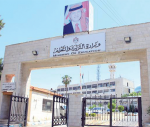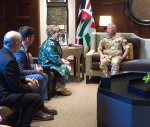You are here
Saving Venezuela
Aug 28,2019 - Last updated at Aug 28,2019
SANTIAGO — Venezuela remains in free fall. Home to the world’s largest proven oil reserves and once Latin America’s wealthiest country, it is now ravaged and suffering complete economic collapse. GDP has fallen 54 per cent from its 2013 peak, the second largest drop recorded in modern history, according to the Institute for International Finance.
With inflation at an eye-popping 10,000,000 per cent this year, according to the International Monetary Fund (IMF), and the minimum monthly wage below $3, a large proportion of the population is destitute. Nearly four million people are malnourished, and some are dying from malnutrition. Diseases that are preventable by vaccination or caused by dirty water, like typhoid fever and hepatitis A, have reappeared, and hospitals, lacking medicines, staff, or equipment, have become dysfunctional, causing still more people to die.
Disastrous economic policies, corruption, and cronyism under President Nicolás Maduro and his predecessor, Hugo Chávez, are entirely to blame. The regime blames this appalling state of affairs on international sanctions, but Venezuela’s economic deterioration started long before. Arbitrary confiscation, as well as crime and street violence, is an ever-present threat, a byzantine array of administrative controls has rendered the price system useless, and there is no foreign exchange to import the spare parts needed to operate trucks and industrial machinery. In this environment, businesses cannot flourish and employment cannot grow.
Sadly, the pain and destruction are not only economic. The most terrifying aspect of Venezuela’s tragedy is the violence inflicted on Venezuelans by their own government. According to the unflinching recent report by the United Nations High Commissioner for Human Rights, and former president of Chile, Michelle Bachelet, thousands of people have been killed in government security operations, and hundreds of government opponents languish in jails, where they are subject to beatings, waterboarding, sexual violence and other forms of torture. With more than four million people, nearly one in eight having already fled to neighbouring countries, there is no excuse for any player in the international community to sit on the sidelines.
In March 2019, the Inter-American Development Bank recognized Juan Guaidó, the president of the National Assembly, as interim president, and Harvard’s Ricardo Hausmann as Venezuelan governor to the institution. The remaining multilateral institutions ought to follow the IDB’s lead. The world must insist on the Maduro regime’s illegitimacy and the need for free elections, a democratic transition, and an end to Venezuelans’ suffering.
Guaidó’s team has already developed a plan to reconstruct post-Maduro Venezuela. The international community should follow suit with a coordinated effort by governments, multilaterals and NGOs. The effort and resources needed to rebuild Venezuela will be vast. The top priorities should be to provide food, fresh water and medical supplies, and to get kids back to school.
This should be followed by infrastructure repairs. The electricity grid has been poorly maintained, water storage and distribution are antiquated, and the agricultural sector, which supplies less than 25 per cent of the country’s food requirements, is in dire need of inputs like fertilisers and seeds. And, with oil output having fallen by more than 70 per cent since 2006, upgrading and restructuring the sector is absolutely crucial.
Venezuela will also have to restore its decimated judicial and legislative institutions, re-privatise nationalised industries with maximum transparency and reduce and restructure its immense $150 billion debt to prevent asset seizures by creditors that could cripple the economic recovery. The interim government has already released a white paper describing its plans to do that.
The international community should lend support in at least three areas. First, it should immediately recognise the need for large debt reduction, rather than attempting to postpone the inevitable for years. Second, the IMF and the other multilaterals will have to provide emergency balance-of-payments support. And, third, grants will be needed to meet urgent humanitarian needs and to prevent foreign debt from building up too fast once again.
But none of this can happen unless and until Venezuela gets a new, legitimate government with full control of the situation on the ground. On-and-off negotiations between the Maduro and Guaidó camps, the most recent rounds of which were sponsored by Norway, have gone nowhere. Maduro’s representatives walked away from the negotiating table earlier this month, claiming that they would not keep talking while the United States ratcheted up sanctions.
Dialogue will indeed be necessary to end the Venezuelan catastrophe. But the international community should not make the mistake of treating talks as a meeting of two parties of good will in need of friendly encouragement to subordinate their differences. Maduro heads a dictatorial regime that inflicts violence and suffering on a daily basis. The representatives of the National Assembly, Guaidó’s camp, are democratically elected officials who have been on the receiving end of that violence. Talks will not bear fruit unless the world’s democracies apply maximum diplomatic pressure on Maduro.
That raises the thorny issue of sanctions. Earlier this month, US President Donald Trump signed an executive order prohibiting all economic transactions with Venezuelan state entities and froze the assets of the Venezuelan government and of a number of Venezuelan officials. Some critics worried, understandably, about the effects on Venezuela’s poor. Others fretted over the possible indirect effect on local private firms, most of which are already on the verge of collapse.
But even those of us who find the Trump administration deeply distasteful must recognise that the case for severe sanctions is strong. Maduro will not leave power out of the goodness of his heart. The recent revelation, confirmed by US and Venezuelan officials, that high-level contacts have been taking place behind closed doors suggests that international pressure is beginning to yield results.
Besides, there is no guarantee that the regime would use additional resources to feed a starving population. During the second quarter of 2019, in the middle of an unprecedented domestic crisis and already under strict sanctions, government-owned oil company PDVSA amortised $800 million to Russia’s Rosneft. Maduro’s priorities are clear.
Given the cataclysmic political, economic, and humanitarian crisis underway, the moral imperative is to act now. Venezuela was once the pride and democratic example of Latin America. It can be that once again: a free, stable and productive country, where citizens live in safety and peace.
Andrés Velasco, a former presidential candidate and finance minister of Chile, is dean of the School of Public Policy at the London School of Economics and Political Science. He is the author of numerous books and papers on international economics and development, and has served on the faculty at Harvard, Columbia, and New York Universities. Project Syndicate, 2019.
www.project-syndicate.org












